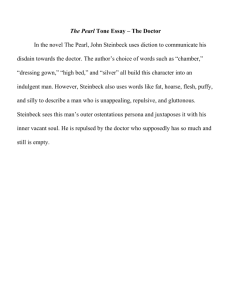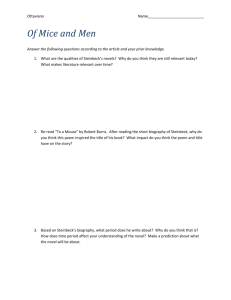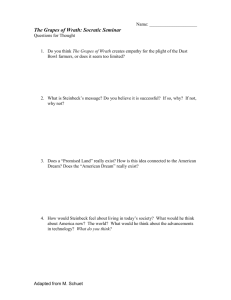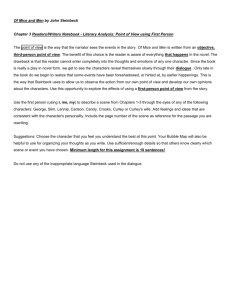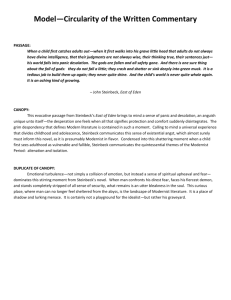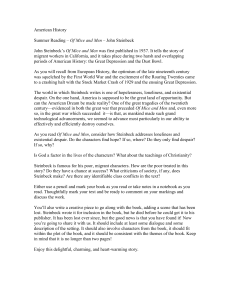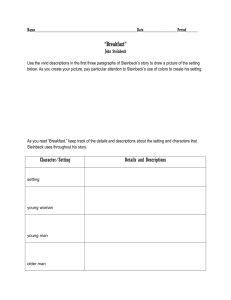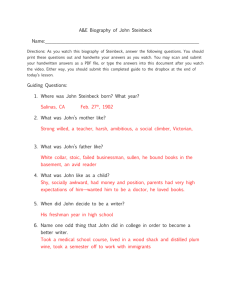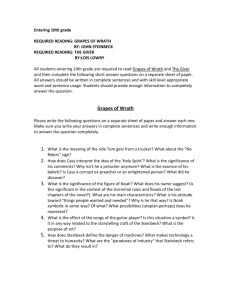Why Soldiers Won't Talk: Steinbeck Essay Analysis
advertisement
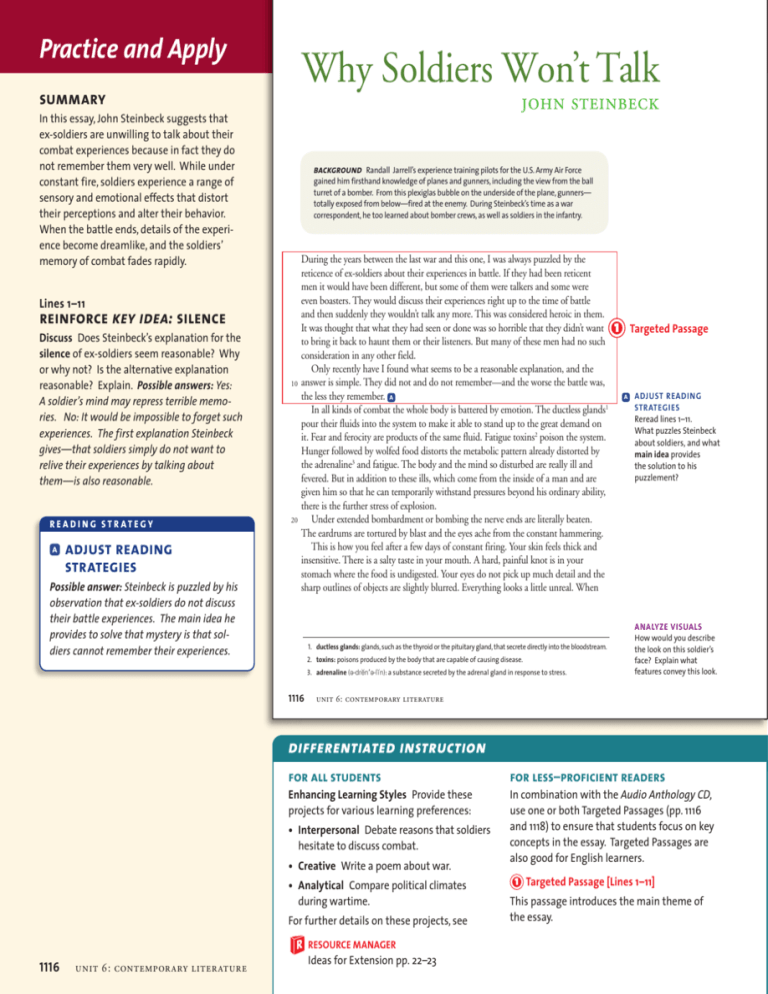
Practice and Apply Why Soldiers Won’t Talk summary john steinbeck In this essay, John Steinbeck suggests that ex-soldiers are unwilling to talk about their combat experiences because in fact they do not remember them very well. While under constant fire, soldiers experience a range of sensory and emotional effects that distort their perceptions and alter their behavior. When the battle ends, details of the experience become dreamlike, and the soldiers’ memory of combat fades rapidly. background Randall Jarrell’s experience training pilots for the U.S. Army Air Force gained him firsthand knowledge of planes and gunners, including the view from the ball turret of a bomber. From this plexiglas bubble on the underside of the plane, gunners— totally exposed from below—fired at the enemy. During Steinbeck’s time as a war correspondent, he too learned about bomber crews, as well as soldiers in the infantry. Lines 1–11 reinforce key idea: silence Discuss Does Steinbeck’s explanation for the silence of ex-soldiers seem reasonable? Why or why not? Is the alternative explanation reasonable? Explain. Possible answers: Yes: A soldier’s mind may repress terrible memories. No: It would be impossible to forget such experiences. The first explanation Steinbeck gives—that soldiers simply do not want to relive their experiences by talking about them—is also reasonable. R E A D I N G STR ATEG Y a adjust reading strategies Possible answer: Steinbeck is puzzled by his observation that ex-soldiers do not discuss their battle experiences. The main idea he provides to solve that mystery is that soldiers cannot remember their experiences. 10 20 During the years between the last war and this one, I was always puzzled by the reticence of ex-soldiers about their experiences in battle. If they had been reticent men it would have been different, but some of them were talkers and some were even boasters. They would discuss their experiences right up to the time of battle and then suddenly they wouldn’t talk any more. This was considered heroic in them. It was thought that what they had seen or done was so horrible that they didn’t want to bring it back to haunt them or their listeners. But many of these men had no such consideration in any other field. Only recently have I found what seems to be a reasonable explanation, and the answer is simple. They did not and do not remember—and the worse the battle was, the less they remember. a In all kinds of combat the whole body is battered by emotion. The ductless glands1 pour their fluids into the system to make it able to stand up to the great demand on it. Fear and ferocity are products of the same fluid. Fatigue toxins2 poison the system. Hunger followed by wolfed food distorts the metabolic pattern already distorted by the adrenaline3 and fatigue. The body and the mind so disturbed are really ill and fevered. But in addition to these ills, which come from the inside of a man and are given him so that he can temporarily withstand pressures beyond his ordinary ability, there is the further stress of explosion. Under extended bombardment or bombing the nerve ends are literally beaten. The eardrums are tortured by blast and the eyes ache from the constant hammering. This is how you feel after a few days of constant firing. Your skin feels thick and insensitive. There is a salty taste in your mouth. A hard, painful knot is in your stomach where the food is undigested. Your eyes do not pick up much detail and the sharp outlines of objects are slightly blurred. Everything looks a little unreal. When 1. ductless glands: glands, such as the thyroid or the pituitary gland, that secrete directly into the bloodstream. 2. toxins: poisons produced by the body that are capable of causing disease. 3. adrenaline (E-drDnPE-lGn): a substance secreted by the adrenal gland in response to stress. 1116 1 Targeted Passage a ADJUST READING STRATEGIES Reread lines 1–11. What puzzles Steinbeck about soldiers, and what main idea provides the solution to his puzzlement? ANALYZE VISUALS How would you describe the look on this soldier’s face? Explain what features convey this look. unit 6: contemporary literature differentiated instruction FL_L11PE-u06s21-sbSoldiers.indd 1116 for all students Enhancing Learning Styles Provide these projects for various learning preferences: • Interpersonal Debate reasons that soldiers hesitate to discuss combat. • Creative Write a poem about war. • Analytical Compare political climates during wartime. For further details on these projects, see RESOURCE MANAGER 1116 unit 6: contempor ary liter ature Ideas for Extension pp. 22–23 1/18/08 11:31:03 AM for less–proficient readers In combination with the Audio Anthology CD, use one or both Targeted Passages (pp. 1116 and 1118) to ensure that students focus on key concepts in the essay. Targeted Passages are also good for English learners. 1 Targeted Passage [Lines 1–11] This passage introduces the main theme of the essay. analyze visuals Possible answer: The soldier looks grim and exhausted. This look is conveyed by the soldier’s unsmiling expression, partly open mouth, and dull, lifeless eyes. Lines 12–21 discussion prompts Use these prompts to help students trace Steinbeck’s point that people respond physically to moments of great stress: Connect Have you ever felt a physical response to an emotional situation? In what ways does that experience help you understand Steinbeck’s description of combat? Accept all thoughtful responses. Analyze How does Steinbeck use verbs to reinforce the ideas he presents? Give examples. Possible answer: Steinbeck chooses strong verbs to convey the feeling of the body being assaulted in various ways. For example, he talks about food that is “wolfed” (line 15), “beaten” nerve ends (line 20), eardrums “tortured by blast” (line 21), and eyes that “ache from the constant hammering” (line 21). Synthesize In what ways does Steinbeck’s description of combat’s effects on the human body expand the reader’s understanding of the selection? Possible answer: Steinbeck’s detailed description helps readers physically experience the vivid ways in which combat affects the senses and damages the body. MFL_L11PE-u06s21-sbSoldiers.indd 1117 • What does Steinbeck observe about ex-soldiers? • Why does this observation surprise him? • What is the “reasonable explanation” that Steinbeck has found? 1/18/08 11:31:19 AM for english learners Key Academic Vocabulary Use Definition Mapping to teach this word: stress (line 19). BEST PRACTICES TOOLKIT—Transparency Definition Mapping p. E6 Prereading For prereading instruction for English learners, see BEST PRACTICES TOOLKIT Scaffolding Reading Instruction pp. 43–46 for advanced learners/ap AP exercises in the bottom channel provide additional challenge for students. Use these suggestions for small groups or individuals. ADDITIONAL GUIDELINES For more help with differentiation and tips for classroom management, see BEST PRACTICES TOOLKIT Differentiated Instruction pp. 31–38 why soldiers won’t talk 1117 L I T E R A R Y A N A LY S I S b ;86I tone and imagery Possible answer: Steinbeck uses sensory ;86I details to describe skin (lines 22–23), 7RITING stomach pain (lines 23–24), and vision (lines 24–25). The scene reveals that soldiers under constant fire experience various sensory distortions and feel somewhat removed from reality. 30 40 If students need help . . . Work with them to complete a Sensory Notes organizer about lines 22–30, pointing out specific descriptive details that appeal to each sense. BEST PRACTICES TOOLKIT—Transparency Sensory Notes p. B9 50 c grammar and style Establish Voice Point out that word choice is a key component in a writer’s distinct voice. Review that sensory verbs evoke sensory reactions while describing actions. Steinbeck uses many sensory adjectives and verbs in this essay because he wants the reader to imagine and feel what soldiers feel. Ask students to find other such adjectives and verbs in the essay, such as thick (line 22), salty (line 23), blurred (line 25), floaty (line 26), beaten (line 31), and deadened (line 43). 60 you walk, your feet hardly seem to touch the ground and there is a floaty feeling all over your body. Even the time sense seems to be changed. Men who are really moving at a normal pace seem to take forever to pass a given point. And when you move it seems to you that you are very much slowed down, although actually you are probably moving more quickly than you normally do. b Under the blast your eyeballs are so beaten that the earth and the air seem to shudder. At first your ears hurt, but then they become dull and all your other senses become dull, too. There are exceptions, of course. Some men cannot protect themselves this way and they break, and they are probably the ones we call shellshock cases.4 In the dullness all kinds of emphases change. Even the instinct for self-preservation is dulled so that a man may do things which are called heroic when actually his whole fabric of reaction is changed. The whole world becomes unreal. You laugh at things which are not ordinarily funny and you become enraged at trifles. During this time a kind man is capable of great cruelties and a timid man of great bravery, and nearly all men have resistance to stresses beyond their ordinary ability. Then sleep can come without warning and like a drug. Gradually your whole body seems to be packed in cotton. All the main nerve trunks are deadened, and out of the battered cortex5 curious dreamlike thoughts emerge. It is at this time that many men see visions. The eyes fasten on a cloud and the tired brain makes a face of it, or an angel or a demon. And out of the hammered brain strange memories are jolted loose, scenes and words and people forgotten, but stored in the back of the brain. These may not be important things, but they come back with startling clarity into the awareness that is turning away from reality. And these memories are almost visions. c And then it is over. You can’t hear, but there is a rushing sound in your ears. And you want sleep more than anything, but when you do sleep you are dream-ridden, your mind is uneasy and crowded with figures. The anesthesia your body has given you to protect you is beginning to wear off, and, as with most anesthesia, it is a little painful. And when you wake up and think back to the things that happened they are already becoming dreamlike. Then it is not unusual that you are frightened and ill. You try to remember what it was like, and you can’t quite manage it. The outlines in your memory are vague. The next day the memory slips farther, until very little is left at all. A woman is said to feel the same way when she tries to remember what childbirth was like. And fever leaves this same kind of vagueness on the mind. Perhaps all experience which is beyond bearing is that way. The system provides the shield and then removes the memory, so that a woman can have another child and a man can go into combat again. d It slips away so fast. Unless you made notes on the spot you could not remember how you felt or the way things looked. Men in prolonged battle are not normal men. And when afterward they seem to be reticent—perhaps they don’t remember very well. � b TONE AND IMAGERY Reread lines 22–30, and note Steinbeck’s use of sensory detail. What does this scene reveal about the soldier’s mental state? c 2 GRAMMAR AND STYLE Reread lines 42–47. Notice how Steinbeck establishes his voice partly by using descriptions that contain realistic sensory adjectives and verbs, such as battered, hammered, and jolted. Targeted Passage d ADJUST READING STRATEGIES Reread lines 55–63. What analogies does Steinbeck use to convey the main idea of this paragraph? What insight into experience does this suggest? 4. shell-shock cases: soldiers with a psychological disturbance as a result of prolonged exposure to active warfare. 5. cortex: part of the brain that plays an active role in consciousness. R E A D I N G STR ATEG Y d adjust reading strategies Possible answer: Steinbeck uses the analogies of a woman experiencing the pain of childbirth and a person with a fever to convey the main idea of the paragraph: the body protects itself against an “experience which is beyond bearing” (line 61) by clouding and then removing the memory of it. Steinbeck’s analogies suggest he may have had some firsthand experience with extremely painful situations. 1118 unit 6: contempor ary liter ature 1118 unit 6: contemporary literature differentiated instruction FL_L11PE-u06s21-sbSoldiers.indd 1118 for less–proficient readers 2 Targeted Passage [Lines 42–63] This passage describes the body’s mechanism for self-protection. • According to Steinbeck, how does the body’s “anesthesia” protect the soldier against the stresses of combat? 1/18/08 11:31:22 AM for english learners Vocabulary: Idioms and Phrasal Verbs [mixed-readiness groups] Share or elicit the meaning of these expressions, and then help students use them in original sentences: • slowed down (line 29), “decreased in speed” • fasten on (line 45), “become drawn to” • What happens after this anesthesia wears off? • wear off (line 53), “lessen in effect” • How is the soldier’s experience like that of a woman in childbirth? • slips away (line 64), “fades, diminishes” • think back to (line 55), “remember, recall”
